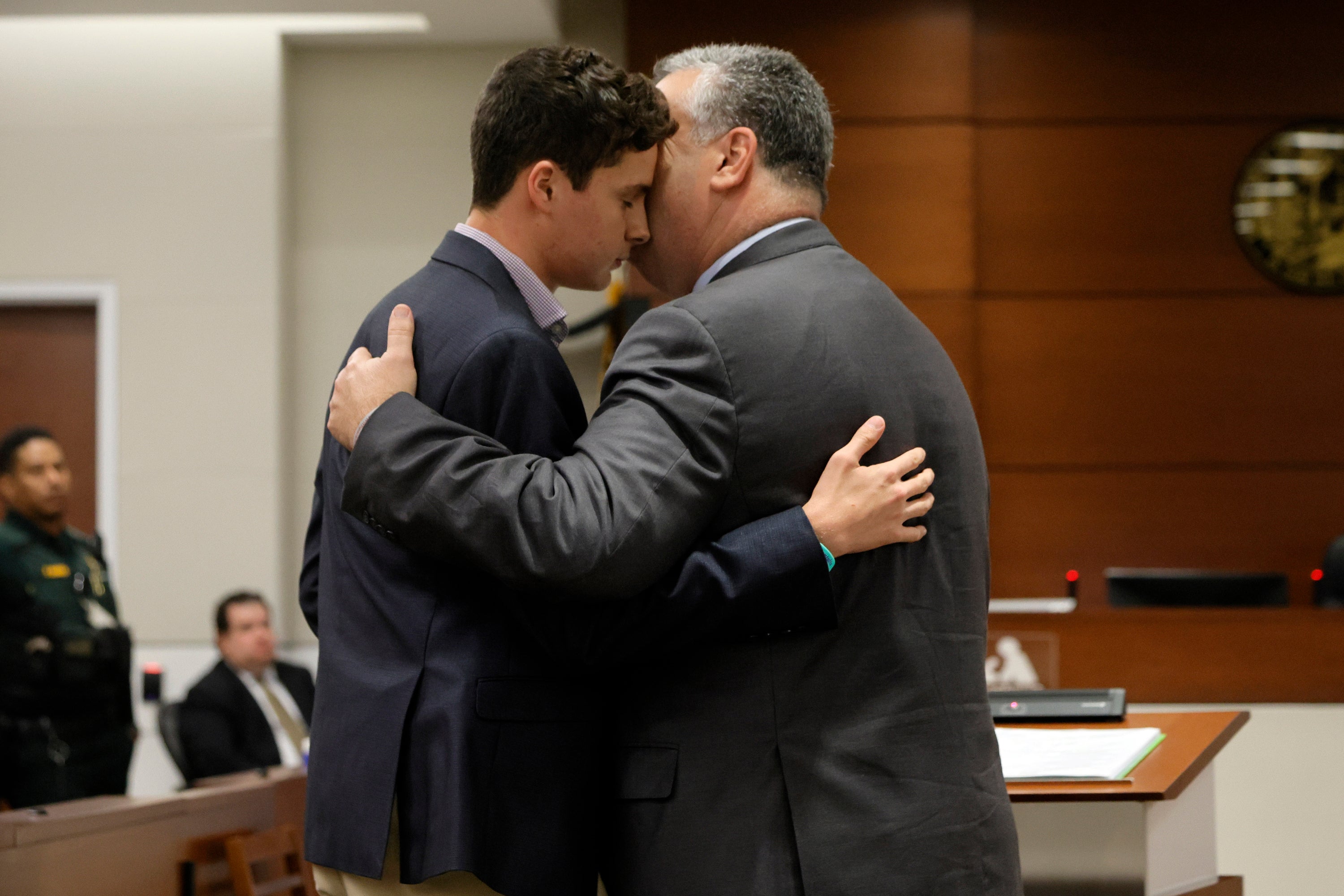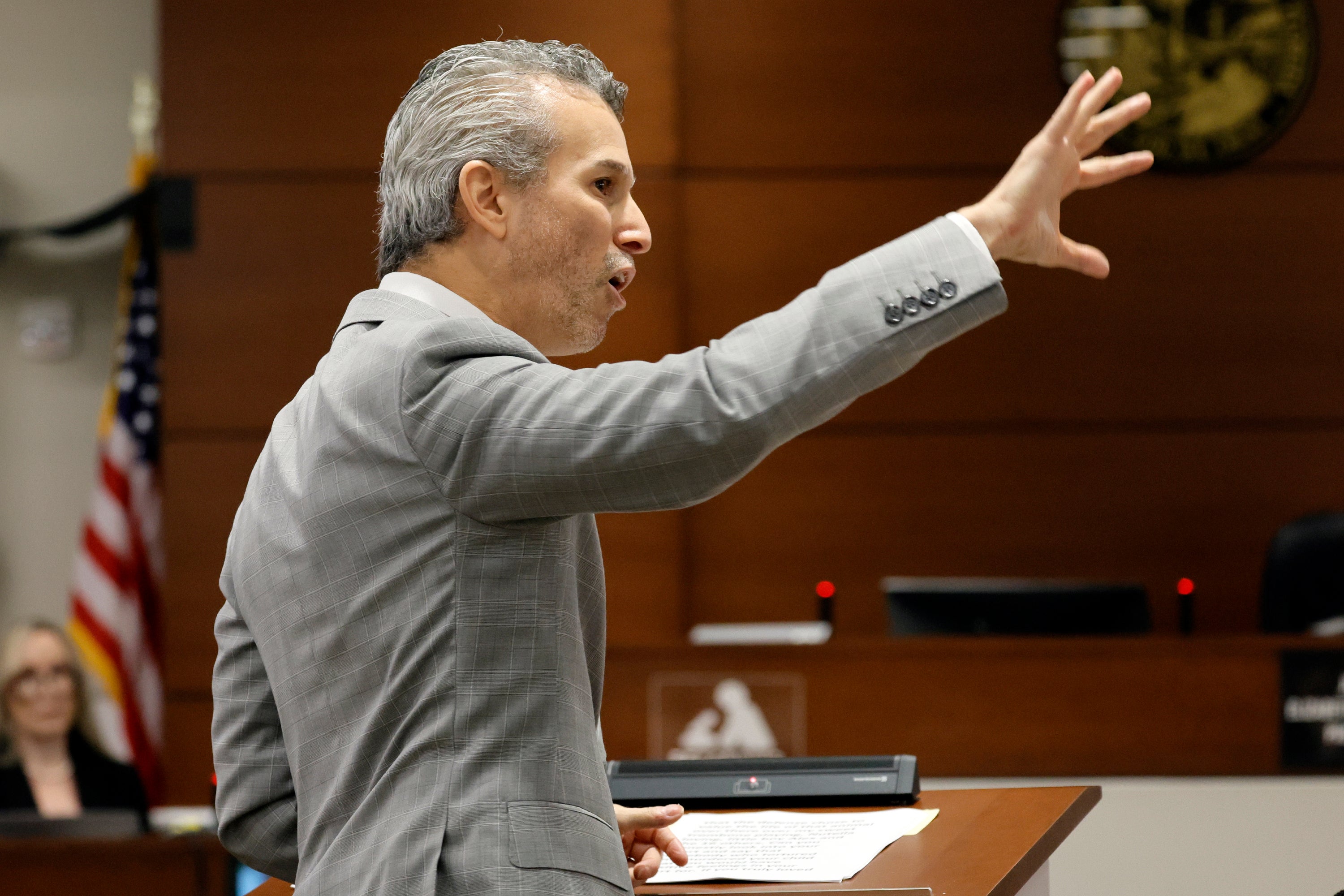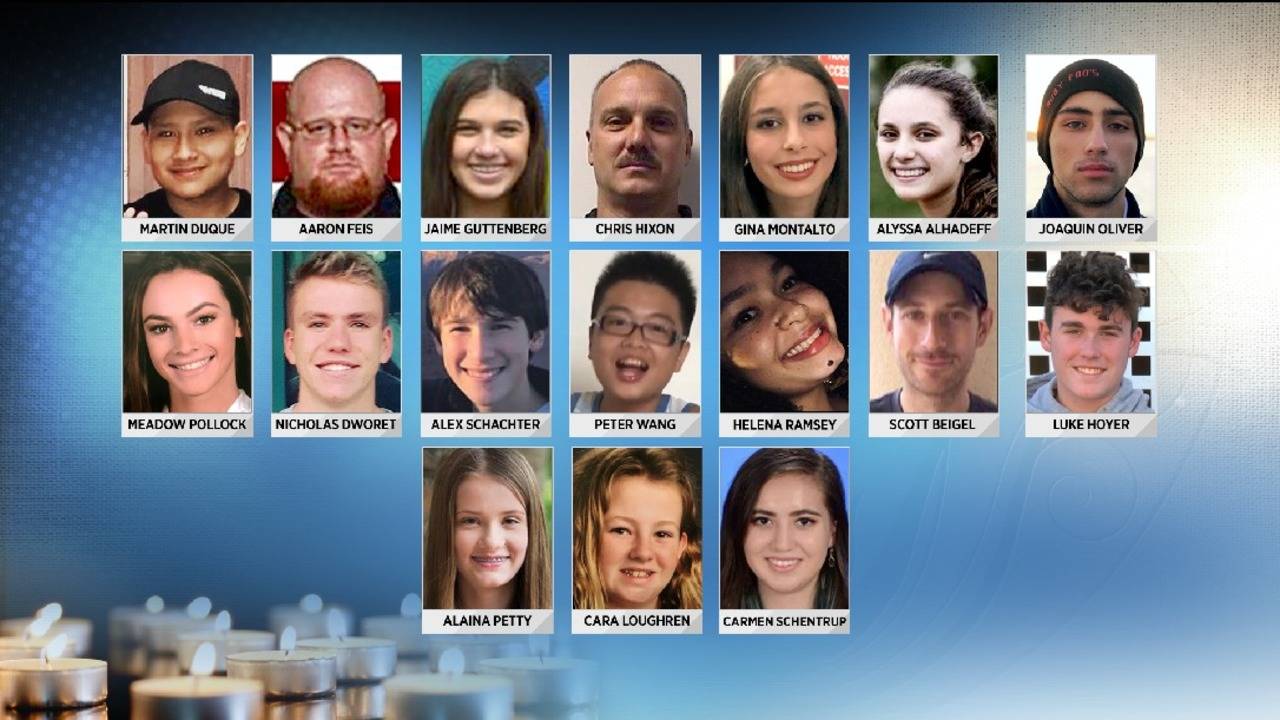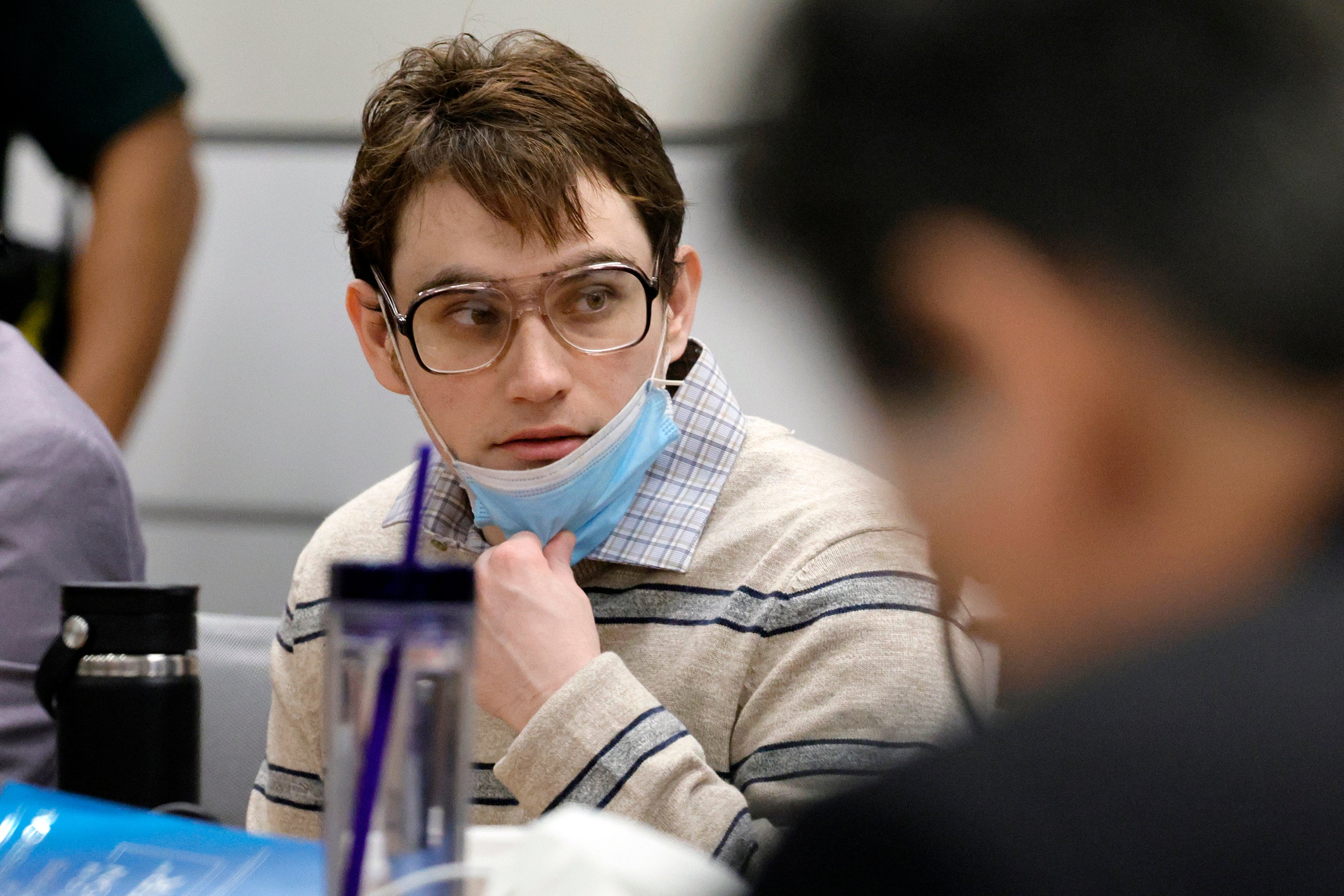Nikolas Cruz is formally sentenced to 34 consecutive life terms in prison for Parkland shooting
Victims’ family members spoke of their devastation with the jury’s verdict after Nikolas Cruz’s life was spared
Nikolas Cruz will spend the remainder of his years behind bars after being formally sentenced to life in prison for the mass murder of 17 students and staff members in Parkland, Florida.
Broward County Circuit Judge Elizabeth Scherer sentenced the 24-year-old on Wednesday, at the end of two days of heartbreaking impact statements from victims and their families outraged that their loved ones’ killer has avoided the death penalty for his crimes.
“I want to thank the family members for the privilege of getting to know your loved ones [through your testimonies],” Ms Scherer said. “I can tell you, they will not be forgotten and I feel I know each and every one of them by the personal stories you have given.”
“You all have been so strong and patient. I can’t help but think how I would behave or respond if I was in your shoes,” she continued. “The way that you have grieved so gracefully and have shown extraordinary restraint throughout this process is something that I have never seen.”
Judge Scherer said that she visited the Marjory Stoneman Douglas High School campus, and although tragedy and sadness were present, the community remained thriving thanks to their strength. She praised the loved ones of victims and survivors for supporting each other throughout their unimaginable loss, and thanked them for their composure during the emotional four weeks of trial.
“I know that doesn’t help at all and If I could take your pain or carry your pain for you, just for five minutes, so you could breathe, I would,” Ms Scherer said. “Because I can’t even imagine what you’re going through today.”
Cruz was sentenced to 17 life sentences without the possibility of parole, and 17 other life sentences with the possibility of parole after 20 years served. The 34 terms are to be served consecutively, Judge Scherer ruled.
After her ruling, Judge Scherer approached family members in the courtroom and embraced them.
Cruz is expected to return to the Broward County Jail until the Department of Corrections determines where he will be housed, local news station WPLG reported.
On 13 October, a 12-person jury recommended that Cruz face a life sentence instead of the death penalty over the Valentine’s Day 2018 mass shooting – in a move that shocked many and horrified the victims’ families.
Jurors found that “especially heinous” aggravating factors necessary to reach a verdict of death had been proven by prosecutors during the trial.
However, three jurors found that these factors were not outweighed by the mitigating circumstances put forward by the defence.
Seventeen-year-old Nicholas Dworet’s mother Annika Dworet read out loud the names of the 17 victims during a powerful victim’s statement, at one point asking “How much worse would the crime have to be” for a jury to sentence a death penalty.
Under Florida law, jurors must be unanimous when returning a verdict of death.

If the panel of 12 had recommended a death sentence, the ultimate decision would have come down to the judge to either agree with their recommendation or choose to instead sentence him to life.
But with nine jurors voting in favour of death and three for life in prison, Cruz automatically receives a life sentence.
Victims’ family members spoke of their devastation with the jury’s verdict as they delivered statements in court on Tuesday.
Anthony Montalto III, whose 14-year-old sister Gina was killed in the massacre, told the court that Cruz “shouldn’t live while my sister rots in the grave”.
The grandmother of victim Alyssa Alhadeff said she wished his days on earth will be “miserable” now that he will outlive her.
“I’m too old to see you live out your life sentence, but I hope your ever(y) breathing moment here on Earth is miserable and you repent for your sins,” said Theresa Robinovitz.
“And burn in hell.”
Max Schachter, whose 14-year-old son Alex was shot dead while sitting at his classroom desk, slammed the defence team for arguing that adequate intervention would have prevented the mass shooting.
“You can’t fix evil,” he said, as he described in graphic detail how Cruz murdered his victims.
“The defence, in their closing argument, said if he had just had the proper diagnosis, things would be different. He was on medicine after medicine … and he still wants to kill,” he said.
“He had well over 200 individual sessions with mental health professionals. … They tried everything, they couldn’t have given him more services.”

He added: “He hunted down innocent children and staff, terrified then tortured them, blew their heads apart like a water balloon and enjoyed it.”
Stacey Lippel, a teacher at the high school who survived the attack, told her attacker how his actions had changed her life forever, leaving her feel like she will never “feel safe again”.
“I’m broken and altered, and I will never look at the world the same way again,” she said.
“I used to be eternally happy and relatively carefree, but now, I have worries and fears that seem unreasonable to most.
“Because of you, I check for exits wherever I am. Because of you, I think of the worst-case scenario for me and my family. Because of you, I will never feel safe again.”
Meanwhile, Fred Guttenberg, whose teenage daughter Jaime was murdered on the third floor of the school, initially declined to give a victim impact statement.
He spoke out on social media, saying that speaking at the sentencing hearing would not change the outcome for Cruz or for his family.
“I have decided that it simply won’t change reality or the way I feel. It won’t make me feel better,” he tweeted.
“The reality is that I will still visit Jaime at the cemetery and the monster’s fate will not change. It has already been decided.”
However, Mr Guttenberg appeared in court on Wednesday after a heated exchange between the defence team and the judge on Tuesday. Mr Guttenberg called for public defender Gordon Weekes to resign.

Over the course of a gruelling three-month trial, prosecutors described how Cruz planned his attack – researching other mass shooters online, making extensive preparations for the massacre and recording a video where he outlined his plans.
The state walked jurors in harrowing detail through the moments Cruz spent inside Marjory Stoneman Douglas High School on 14 February 2018, stalking the freshman building, murdering students and staff in his path.
Jurors also watched graphic footage of the killer slaughtering his victims – shooting some multiple times and at point-blank range – and toured the bullet-ridden and bloodstained massacre site.
While the state asked for the death penalty, Cruz’s team of public defenders asked for his life to be spared, saying that mental and developmental conditions led him to carry out the massacre.
The defence focused much of its case on the argument that he has fetal alcohol spectrum disorder (FASD) caused by his biological mother drinking while pregnant.
On Valentine’s Day 2018, Cruz, then 19, took an Uber to Marjory Stoneman Douglas High School armed with an AR-15 and entered the freshman building.
He stalked the three floors of the building, murdering 14 students and three staff members.
The 14 students killed were: Alyssa Alhadeff, Martin Duque, Nicholas Dworet, Jaime Guttenberg, Luke Hoyer, Cara Loughran, Gina Montalto, Joaquin Oliver, Alaina Petty, Meadow Pollack, Helena Ramsay, Alex Schachter, Carmen Schentrup and Peter Wang.
The three adults killed were: Scott Beigel, Chris Hixon and Aaron Feis.

Following the murders, Cruz escaped the scene by hiding in plain sight among terrified students and staff fleeing the school.
Chilling surveillance footage shown at trial revealed how he calmly went to a nearby Subway for a drink.
He then stopped by a McDonald’s where he sat next to and spoke with the brother of one of the students he had just shot and injured.
Cruz was arrested later that day and has been behind bars ever since.
In October 2021, he pleaded guilty to 17 counts of murder and 17 counts of attempted murder.




